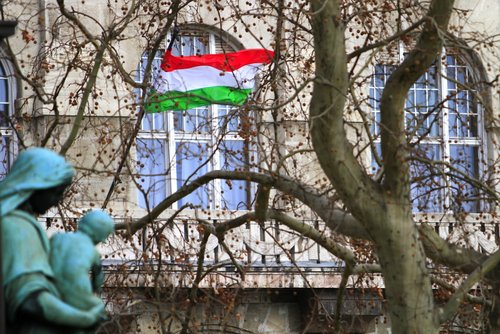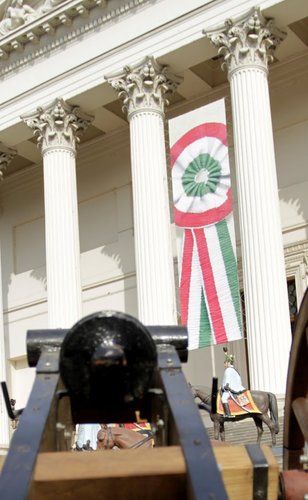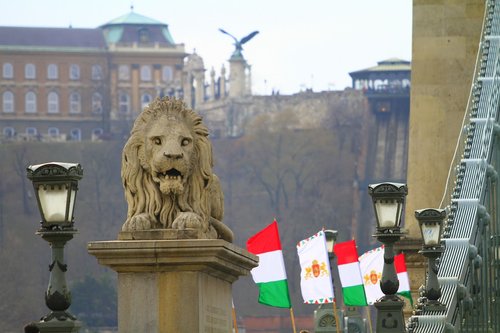Scottish Mission in the Midst of Revolution
2016. március 08., kedd15 March is a national holiday and a day of celebration throughout Hungary to remember the Hungarian revolution in 1848 and subsequent war for independence. It affected everyone in Hungary, including the Scottish Mission partners of the RCH. During this tumultuous political time, the Scots were engaged in a complex struggle to minister to a community who needed them in the midst of a city that sometimes did not want them.
Since their arrival to Budapest in 1841, Scottish missionaries were protected fervently by the Archduchess Maria Dorothea and, through her influence, the Archduke as well. They came to the city to spread the gospel among the Jews and as time passed they ministered to the local community by also opening a school and circulating religious publications to the population. In January of 1847, the Archduke fell ill and passed away, at which point the Archduchess was called to Vienna by Imperial mandate. With their two biggest supporters gone, other religious and political groups in the city began a public image attack on the Scottish Mission in Budapest, writing pieces in local newspapers in an effort to discredit them. In his book, The History of the Free Church of Scotland’s Mission to the Jews in Budapest and its Impact on the Reformed Church of Hungary, Dr. Ábrahám Kovács writes that, “With the death of the Archduke and the removal of Maria Dorothea the Scottish Mission’s position became extremely vulnerable.”

The following years were filled with opposition to and suspicion of the Scottish Mission from both the Habsburg Empire as well as the strong Roman Catholic presence in the city. The Mission continued to be attacked in the press and, according to Dr. Kovács, “József Havas, who was the Chief Judge in Pest […] collected intelligence on the activities of the Mission.” Factions in the city spread gossip that the Archduchess and the Mission were conspiring against the ruling monarchy, and the Hapsburgs took notice.
The Hungarian revolution against the Habsburgs began on 15 March, 1848 with massive demonstrations throughout the Hungarian capital of Buda and its sister city, Pest; crowds marched through the streets and smaller uprisings followed throughout the Hungarian territory of the Habsburg Empire as well. These gatherings pressured the imperial government to appoint a new parliament and this independent government quickly passed a set of reform laws called the "April Laws”. These laws gave Hungary control of its National Guard, national bank and foreign policy, abolished serfdom, extended toleration of all Christian groups, granted freedom of the press, and in effect, created a democratic Hungarian government. Religious tolerance was more plentiful and, according to Dr. Kovács, one of the Scottish missionaries, Smith, commented that their work was freed from, “an oppressive load – the [Catholic Austrian] government under which they trembled having fallen with its whole system of espionage and corruption.”
Upon bestowing these new freedoms to the Hungarian territory, the Habsburg Empire realized that it set a dangerous precedent for democracy in their lands; other territories soon began to want the same freedoms and the Empire could not let this stand. The Habsburgs responded by sending Austrian and Croatian troops into Hungary to crush the democratic movement and a war took over the country from September of 1848 until August of 1849, which caused the Scots to leave Hungary due to safety concerns. According to G. Alexander Kish in his book The Origins of the Baptist Movement Among the Hungarians, Scottish missionary Robert Smith wrote only that, “Our work had been interrupted during the period of the war.”

Kovács says that, before their departure, the Scots “approached Israel Saphir and György Bauhofer to take charge of the Mission; its school, congregation and colportage.” Thanks to them, the school, weekly worship, and the religious publications continued in the absence of the missionaries. The scholar Frederick Metzger, who ministered in Hungary until he was expelled in 1949, wrote in his article, Hungary, The Jews and the Gospel, that Saphir, a prominent Jew who converted to Christianity in 1843 and whom some date the “turnaround in the spiritual state of the Hungarian Reformed Church” to, even held services in his own home each Sunday to keep the faith community alive during the absence of the missionaries.
Despite the adversity that the Scottish Mission faced in Budapest during the war for independence, the community that they had built during their time in the city came together to care for one another during this hard time. As soon as the war was over, the Scottish missionaries returned to Budapest and were pleased to see the various ministries still up and running. Following the war, the Catholic Hapsburg Empire became more oppressive towards Protestant churches. According to Kovács, in February of 1850, the Chief Commander of the Hapsburg Army issued an edict which, “imposed administrators on every level of ecclesiastical jurisdiction to control the previously autonomous Protestant Churches.” He also says that, “Smith observed that the churches were ‘deprived of their self-government and spiritual freedom, which amidst a thousand persecutions, they had maintained for three centuries’.”

After the war for independence, the Scottish Mission lost much of its former support in the city, partly because of the removal of the Archduchess Maria Dorothea from Budapest.
Due to this, the Scots began serving in the German speaking congregation. According to Rev Bertalan Tamás, a former Hungarian pastor of the Scottish Mission, the missionaries at this time “were clever and chose a pastor who had a German sounding name,” so that their choice would not arouse suspicion from the Habsburgs. As political tensions increased in the following years, the Scottish Mission was even run by Reformed Hungarian pastors trusted by the Church of Scotland, many of whom had even attended seminary in Scotland (such as Rev Tamás). This partnership between the Reformed Church in Hungary and the Church of Scotland is what has helped this vital faith community stand the test of time. “The greatest thing in this story is that they really wanted to continue their Mission in Hungary, in spite of the difficult times,” sums up Tamás. This year marks the 175th anniversary of the Scottish Mission in Budapest, and the connection is still as strong as ever.

The Széchenyi Chain Bridge, the first permanent bridge across the Danube in Hungary, was designed by the English engineer William Tierney Clark in 1839, and was opened in 1849. The construction was supervised locally by Scotsman Adam Clark. It opened in 1849.
Today, 15 March is a day of national pride and holds a special place in Hungarians' hearts. Everywhere, people will gather in the streets clad in red, white and green to celebrate the day the revolution was born, the country's fleeting independence, and the memory of those brave souls who helped attain it. It is a day to recognize all types of courage that was shown during this hard time, from political fighters to religious communities as well.
The Reformed Church in Hungary would like to express its deepest appreciation to all of the people who made this article possible: Dr. Ábrahám Kovács, for researching and explaining so eloquently the history of the Scottish Mission in Budapest; Rev Aaron Stevens, the current pastor at the Scottish Mission, for collecting and sharing the vast wealth of online articles about the Scottish missionaries who came to Hungary; and Rev Bertalan Tamás, former Ecumenical Officer for the RCH and Rev Stevens’ predecessor at the Scottish Mission, for many enlightening conversations about the nature of the Mission during the years following the revolution of 1848.
Text by Kearstin Bailey
Photos: Reformatus.hu
Contact us
Click here if you are interested in twinning.
Reformed Church in Hungary
Address: H-1146 Budapest, Abonyi utca 21.
PO Box: 1140 Budapest 70, Pf. 5
Email: oikumene@reformatus.hu
English, German and Korean language services in Budapest
Links
Recommended articles
-
Pastoral Letter in the Light of the Pandemic
Bishop Dr. István Szabó sent a pastoral letter of encouragement to the ministers serving in RCH’s congregations, expressing his gratitude for the persistence and creativity of the pastors.
-
RCH Joins in Pope's Call for Prayer
RCH published the call on congregations to join the initiative of Pope Francis, supported by ecumenical organisations, to unite in praying the Lord’s Prayer on Wednesday, 25 March, at noon.
-
English Speaking Worship Services Online
Each Sunday at 11 AM (CET) the St. Columba's Church of Scotland in Budapest, the international community of RCH invites you to join the worpship service on its facebook page.
-
Test of Humanity and Companionship
Reformatus.hu asked Dr. György Velkey, Director General of the Bethesda Children’s Hospital of RCH about the challenges of health care workers and ways of prevention against the pandemic.
-
All Church Events Suspended
In light of the coronavirus the Presidium of RCH requested congregations to suspend all church events with immediate effect. Beside restrictions, it calls for prayer, sobriety and responsibility.











